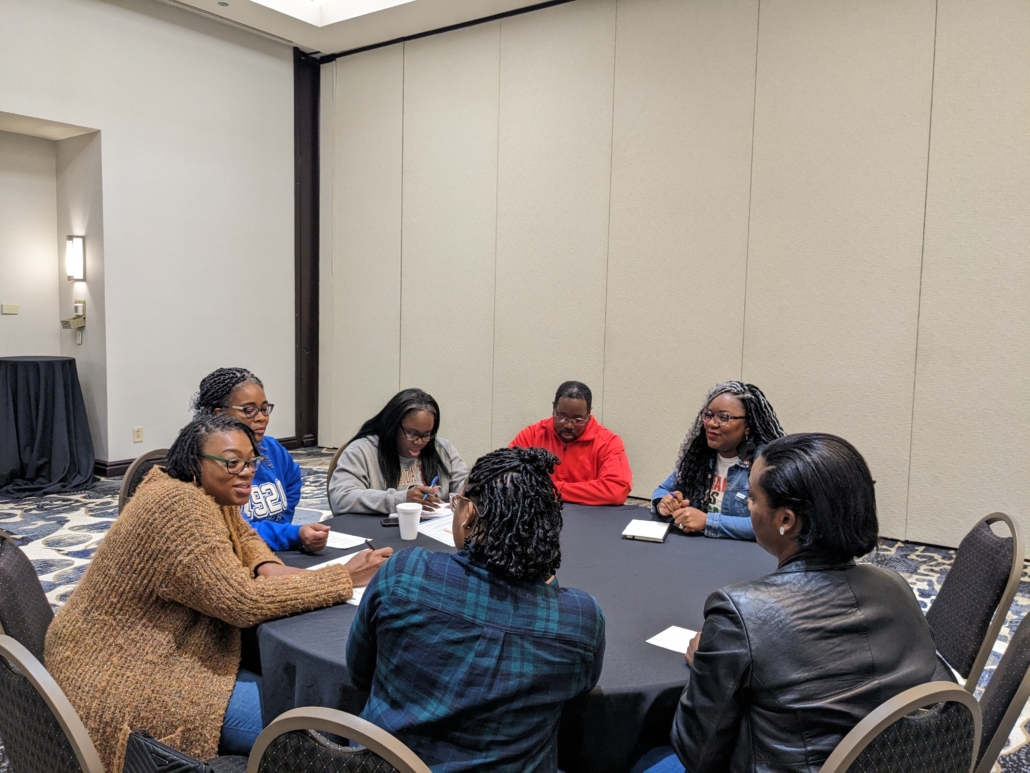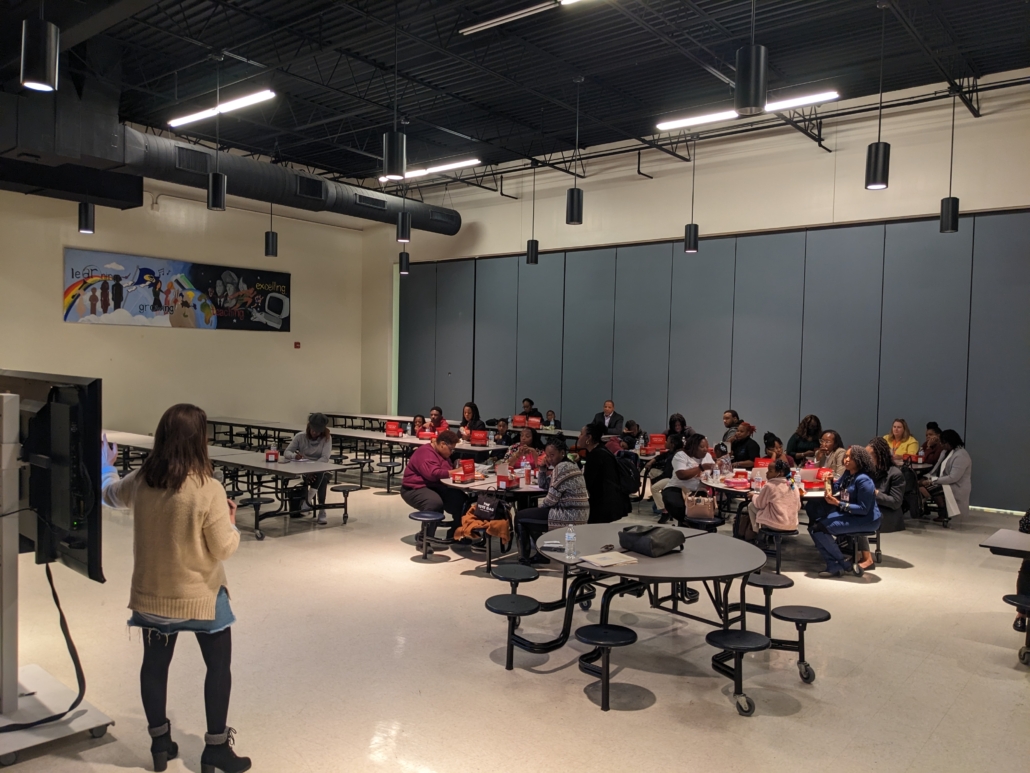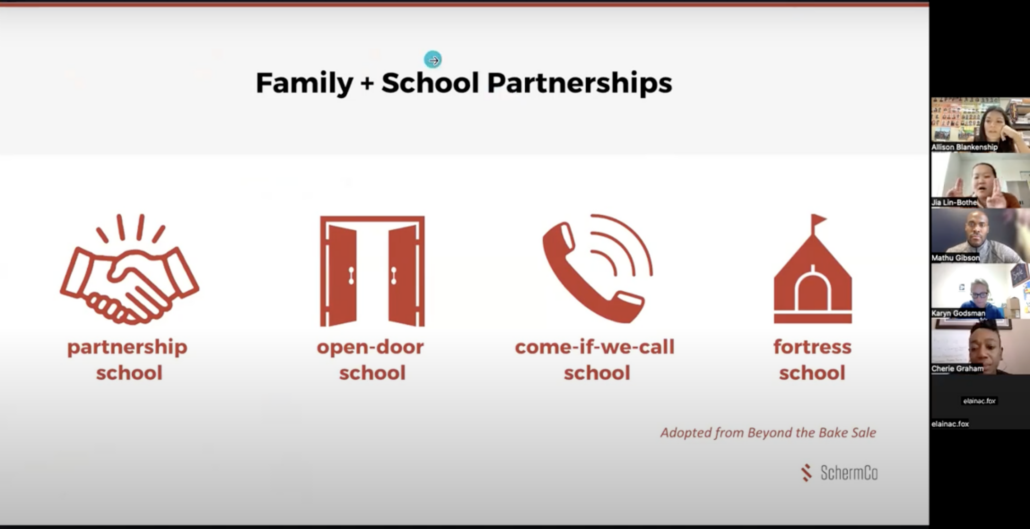#93 – Five Takeaways from the 2022-23 School Year
Written by Jia Lin-Bothe, Director of Family Empowerment

One win: We collaborated with Innovate Public Schools to host their first-ever Parent Leader Institute on the East Coast. We supported 14 parent leaders from our schools for this opportunity, and seven of those parent leaders completed the training.
As we step into the 2023-24 school year, it’s only natural to take a moment to look back at the one we’ve strongly finished. Each year brings unique challenges, triumphs, and lessons, and the 2022-23 school year was no exception. It was my first full year leading our family empowerment work, and I want to take you through five moments that stood out to me.
- Families like to and want to engage. This shouldn’t be a surprise in our line of work, but I can’t claim that we have the magic formula. It’s a combination of different factors: understanding the day and time that families are most available, listening to and honoring what families need and want, creating excitement for families and students about the upcoming event, utilizing the 10×5 communication matrix strategy, ensuring that the school has a welcoming environment, and more.
- I am learning that passing out flyers at arrival and dismissal car lines is one great way to invite families to upcoming events at the school. Having these face-to-face interactions with families is one of my favorite parts of the job, as I am helping the school create additional excitement about the event and ensuring that families feel invited.
- There have been instances when families are interested in the topic of an upcoming family-focused event, but due to work or family obligations, they’re not able to attend. I’m learning that it’s important for all families at the school to have access to information and resources being shared at family-focused events, especially when they could not attend the event. We’re constantly fine-tuning our approach and have started to help schools draft communication to share resources with families after an event and weekly family newsletters to ensure information is being funneled to families.

It was great to have 64 attendees at Sugar Creek Charter School’s Financial Education Workshop.
- Families are interested in connecting to resources, but are they following through? In our model, we learn what parents/caretakers and students at each school need and want through our pre-surveys. However, these areas of requests may come across as vague categories, for example, “afterschool and summer school programs” or “physical health and exercise resources.” Do families need help getting access to free and quality tutoring programs? Do families require transportation for their students to get to the afterschool programs? Do families need support getting connected to community clinics? Do families need affordable gym memberships? Do families need guidance on nutrition?
- Creating meaningful and relational connections rather than being transactional is important. At each partner school, we aim to form a Family Empowerment Committee consisting of school admin, staff, teachers, and, more importantly, parents and caretakers. In our monthly meetings, we review family-related data and plan for upcoming events. It is during these meetings that I am learning to ask questions to ensure upcoming events are more intentional and focused on what families need and want.
- In another example, we’ve been sharing information related to financial education and hosted financial empowerment workshops focused on credit building, debt consolidation, budgeting, etc. At the end of one of these workshops, a parent leader told me that these workshops are great, but they’re not for her. She’s looking for something more advanced and was interested in learning more about strategies to maximize her retirement benefits. I later learned that at least a handful of families who had attended a financial education workshop in the past were also interested and ready to dive deeper into their financial empowerment journeys. Of course, we honored that request and worked with Common Wealth Charlotte to assemble a hybrid series of retirement planning and investing workshops.
- As we continue to plan programming with our schools for families, we need to become more intentional in providing families with choices and having various levels of workshops to cater further to their needs and situations.
- There are a handful of community-based organizations that we’re consistently tapping for support with our families. As we move into a new school year, I’m doing better to connect with them, not only to provide updates but to collaborate and dive deeper. Similar to the financial education example above, we’re working closely with Common Wealth Charlotte on a match-savings pilot so that more families are supported in their journey to financial freedom.

Through Zoom, we continued our Quarterly Convenings to connect with our school partners and share best practices.
- I believe the most successful events have components for students and families (adults). Here are three first-hand accounts.
- (PreK-5) Reid Park Academy’s Let’s Walk A Day In Your Child’s Shoes. Students were given a scavenger hunt to complete with their families at this event. The directions were all student-centered, and parents/caretakers saw the school from their students’ perspectives.
- The principal voiced how she appreciated students introducing their families to her.
- A total of 149 people came out to this event. 84.44% of families who attended this event responded that they were extremely likely to recommend this event to another family, and 88.88% responded that the event was extremely relevant to them.
- (Grades 6-8) Wilson STEM Academy’s Food, Fun, & Fellowship Nights. During these events, parents/caretakers and students had a rotation schedule. Parents/caretakers got to learn more about information about the school through a game similar to Bingo.
- The families were competitive and left the night hungry for the next family night. Notable comments included:
- “Everything was great. You all did a great job of bringing this event together and making it interactive for parents. I enjoyed myself!”
- “This is my first ever family event, and it is amazing!”
- “It was fun, the information was very good, and I would love to do it again!”
- The families were competitive and left the night hungry for the next family night. Notable comments included:
- (Grades 9-12) Harding University High School’s Empowerment Blitz. Students had study sessions for their upcoming End-of-Course exams, while parents/caretakers attended sessions related to financial education, mental health, and school updates. At the end of the event, parents/caretakers, and students joined together for a meditation session. Notable comments included:
- “I am speechless! The willingness and love with which it was organized meant a lot. Thank you!”
- “The communication and respectfulness of the event were helpful. I loved it!”
- “[I enjoyed] spending time and learning about finances with my family.”
- “Learning how to communicate with my children and mental health tips was useful.”
- By creating opportunities for interaction, collaboration, and shared experiences, we can strengthen families’ bonds with their school community.
- (PreK-5) Reid Park Academy’s Let’s Walk A Day In Your Child’s Shoes. Students were given a scavenger hunt to complete with their families at this event. The directions were all student-centered, and parents/caretakers saw the school from their students’ perspectives.
- In the 2022-23 school year, “physical health and exercise” and “mental health services” were among two of the top five areas families requested support with. As we head into another school year, we hear schools cite mental health as an area where their students need support. How can we ensure all families (especially those uninsured and underinsured) have access to the care and support they need?
- I don’t have an answer for this, but I am learning to connect schools and families to resources more intentionally. Here are some questions I ask community health clinics before inviting them to a school event:
- Do you offer mental health services?
- Do you have payment options for those who are uninsured and underinsured? Do you use a sliding scale? Interest-free payment plans?
- What’s your current caseload? Do you have the capacity to accept new clients?
- What languages do you and your staff provide services in?
- I don’t have an answer for this, but I am learning to connect schools and families to resources more intentionally. Here are some questions I ask community health clinics before inviting them to a school event:
- In the 2022-23 school year, we collected a total of 3,881 pre- and post-surveys from families. In the 2023-24 school year, I’m setting a goal for us to collect an average of 30% in survey response rates across our partner schools, and an average of 40% in response rates as a long-term goal.
- Across the nation, the top 1% of Title I schools have a 40% response rate for paper surveys with families. The 40% response rate has been surpassed with some school partners, and with others, I believe we can get there within the next few years.
As we head into the 2023-24 school year, I’m keeping myself accountable by being more intentional. Here’s to another year of family empowerment, meaningful feedback, and positive change.
—
Action Items:
- Join us for our upcoming webinar to hear all things data from the 2022-23 school year! Fill out this form, and we’ll be sure to send you a calendar invite!
- Check out our data from the 2022-23 programming year!
- Are you a school leader and considering ways to support your families this year? Reach out to me at jia@schermcofoundation.org to see how our team can implement a plan to support your families!

Leave a Reply
Want to join the discussion?Feel free to contribute!